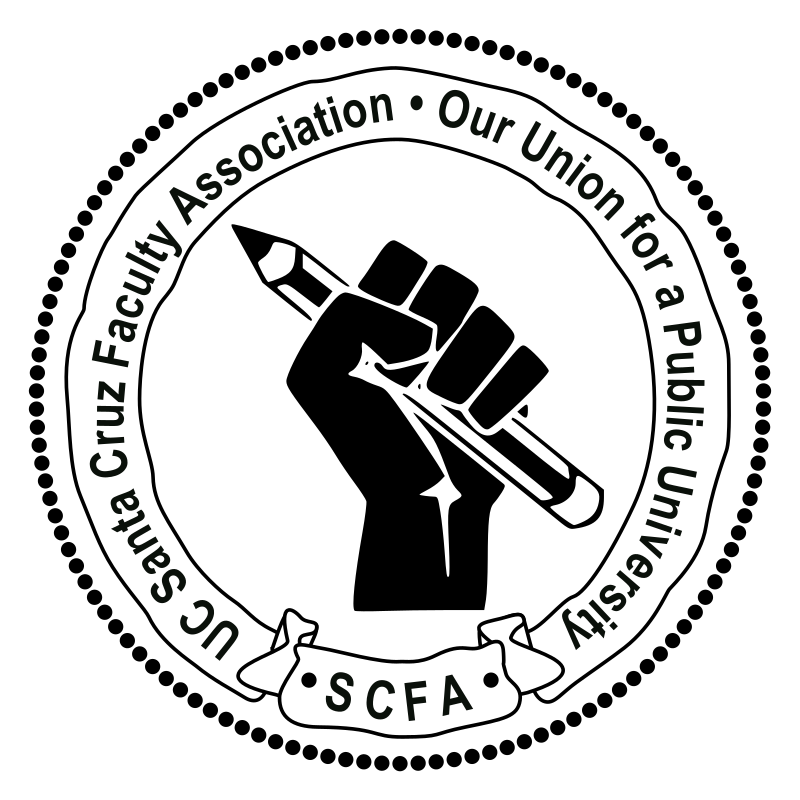Below is a copy of a letter CUCFA sent to the chair and vice chair of the systemwide Academic Senate regarding the academic advisory committee for the selection of a new UC President.
————————————————–
October 7, 2019
With President Napolitano’s announcement of her resignation, effective August 2020, it is vital to undertake a search process that is open and participatory to counter a national (and UC) trend toward secretive top-down searches that look for a chief executive to preside over the university. Rather, we should seek a selection process that develops the kind of leader we need through democratic consultation with UC’s constituents – faculty members, students, staff, and alumni. Disastrous recent presidential searches in South Carolina, Iowa, and Colorado show what happens when a governing board unilaterally produces a candidate whose remoteness from educational functions and faculty they deem a virtue.
Fortunately, the UC Regents have a formal search process that could ensure an active, democratic, consultative, and representative presidential selection. Regents Policy 7101 prescribes a number of steps following from the formation of a Special Committee comprised of six Regents and other ex officio members that consults with the Regents to set the criteria for the search, discusses potential candidates, and participates in making the final appointment. The Policy describes a potentially huge and dynamic systemwide consultation process that establishes four advisory committees representing faculty, students, staff, and alumni.
The Policy calls for the Chair of the Special Committee to invite the Academic Council to appoint an Academic Advisory Committee, our concern here, composed of not more than thirteen members, including the Chair of the Academic Council and at least one representative of each of the ten campuses, to assist the Special Committee in screening candidates. It is difficult to imagine how each of those Academic Advisory Committee members could represent the views of hundreds if not thousands of faculty between campuses and medical centers, across all disciplines, which have diverse needs, and across racial groups, which also have diverse needs.
So, too, it is not clear how the Academic Advisory Committee members, even if they are prestigious faculty members, campus heavyweights who are recognized as speaking authoritatively for (the leadership of) each campus, would influence the Special Committee or the Board of Regents. In the last three UC presidential searches, the business culture of the Regents has disregarded the professional culture of the faculty. The class gaps between professors and most regents are too wide and, in any case, faculty are stripped of decision rights.
The Policy, however, puts no limitations on the activities of the Advisory Committees. They could affect the presidential search by using the committees to prompt campus discussions about the presidential search in the context of the immediate future of UC. All of the Advisory Committees could set up a series of events in which they talk with their constituents on each of the ten campuses. They would listen to hopes and fears, gather ideas about leadership needs, hash them over, and then transmit the resulting comments, recommendations, or demands to the Special Committee. One faculty member suggested a “UC Day” in which town halls or other public events happen across the UC system at the same time. The Advisory Committees would have to identify a deadline that would fall before the Special Committee’s long-listing and short-listing of candidates such that it (and the Board overall) could fully consider the input. Each committee could do its work in about six weeks. The scope of the issue is limited and the reports could be short.
Another benefit of using the ACs as a public fulcrum: the town halls would be newsworthy. Whatever governing boards think of professors, unions, and students, they do care about institutional reputation, media coverage, and what they hear back from VIPs as a result of that. The timing of these town halls would be especially propitious in the context of the surprisingly vibrant national discussion in the presidential primary races of the need to return to the idea of higher education as a public good rather than a private commodity. The town halls could also serve to promote UC’s and California’s reputation for pioneering the original free college plan five decades ago. California’s Master Plan for Higher Education is globally recognized as having served as the key cultural and economic engine of California. We could again be a model and inspiration for other states and the nation of how to provide free quality higher education for the masses.
Notably, the parting words of both former UC President Yudof and outgoing President Napolitano emphasized the greatest regret of their respective tenures: that they should have been more consultative and deliberative with the faculty.
The CUCFA Board asks Academic Council President Bhavnani to form a democratic and representative Academic Advisory Committee formed of the chairs of the campus Academic Senates, who are directly answerable to their constituents. We also urge you to charge that committee with organizing town halls or other public events on each campus to prompt as large and participatory discussion as possible of both criteria for the selection of a new President and specific candidates for the job.
CUCFA is eager to partner with the Academic Council on this path towards greater and more democratic input by our faculty on a matter of great relevance to the life of our University.
Sincerely,
Constance Penley,
President, Council of UC Faculty Associations
and Professor of Film and Media Studies, UCSB
